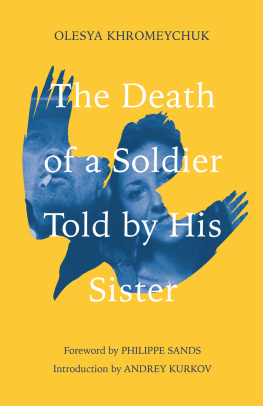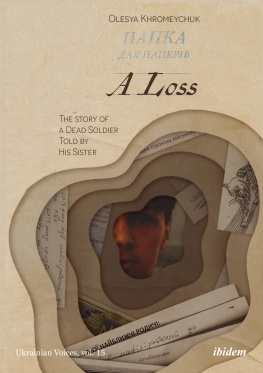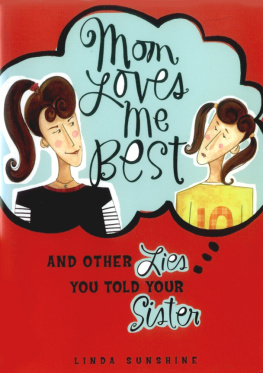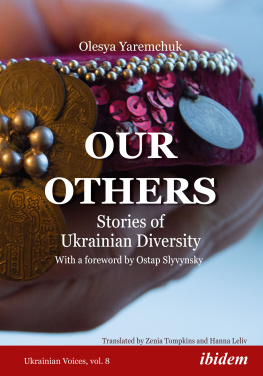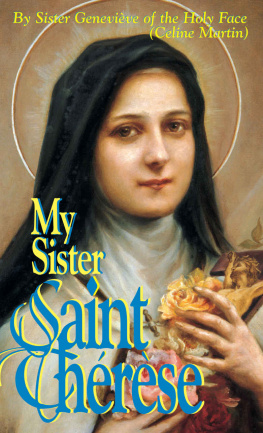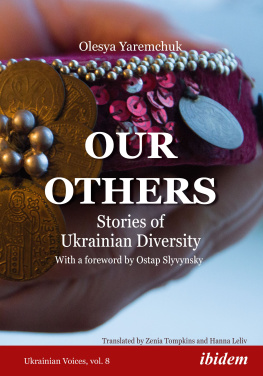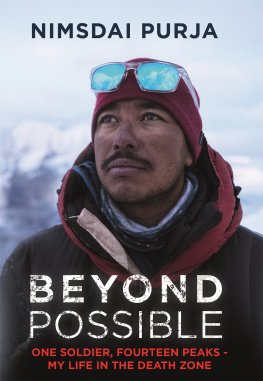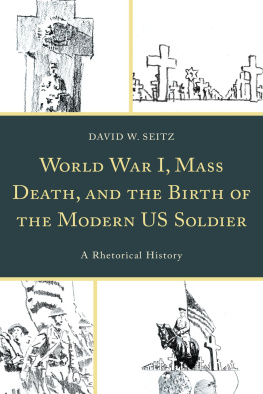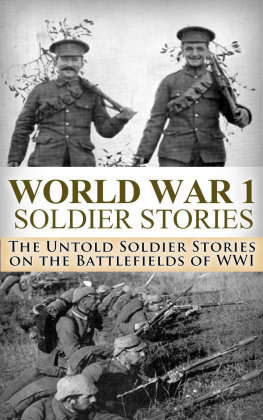Olesya Khromeychuk - The Death of a Soldier Told By His Sister
Here you can read online Olesya Khromeychuk - The Death of a Soldier Told By His Sister full text of the book (entire story) in english for free. Download pdf and epub, get meaning, cover and reviews about this ebook. year: 2022, publisher: Octopus, genre: Art. Description of the work, (preface) as well as reviews are available. Best literature library LitArk.com created for fans of good reading and offers a wide selection of genres:
Romance novel
Science fiction
Adventure
Detective
Science
History
Home and family
Prose
Art
Politics
Computer
Non-fiction
Religion
Business
Children
Humor
Choose a favorite category and find really read worthwhile books. Enjoy immersion in the world of imagination, feel the emotions of the characters or learn something new for yourself, make an fascinating discovery.
- Book:The Death of a Soldier Told By His Sister
- Author:
- Publisher:Octopus
- Genre:
- Year:2022
- Rating:4 / 5
- Favourites:Add to favourites
- Your mark:
- 80
- 1
- 2
- 3
- 4
- 5
The Death of a Soldier Told By His Sister: summary, description and annotation
We offer to read an annotation, description, summary or preface (depends on what the author of the book "The Death of a Soldier Told By His Sister" wrote himself). If you haven't found the necessary information about the book — write in the comments, we will try to find it.
The Death of a Soldier Told By His Sister — read online for free the complete book (whole text) full work
Below is the text of the book, divided by pages. System saving the place of the last page read, allows you to conveniently read the book "The Death of a Soldier Told By His Sister" online for free, without having to search again every time where you left off. Put a bookmark, and you can go to the page where you finished reading at any time.
Font size:
Interval:
Bookmark:


In memory of Volodymyr Pavliv (19742017)
Select one of the chapters from the and you will be taken straight to that chapter.
Look out for linked text (which is in blue) throughout the ebook that you can select to help you navigate between related sections.
You can double tap images to increase their size. To return to the original view, just tap the cross in the top left-hand corner of the screen.
My generation believed war in Europe was over. We had read of it in distant lands, including the proxy wars fought by leaders in the name of our security. We had experienced local acts of murderous violence, characterized as terror, like The Troubles in Northern Ireland, or the attacks of September 11th, a day on which I happened to be in New York. We had watched the collapse of the former Yugoslavia. But the horror of a full-scale war of armies on the march, of international borders crossed by tanks, of blockades and aerial bombardments, of prisoners taken and militants executed? No. That, we believed, was a matter of history.
Then Ukraine entered my life. A decade ago, I received an invitation to deliver a lecture in Lviv, at the historic law school. One thing led to another new encounters, research on the origins of genocide and crimes against humanity, a search for the house where my grandfather Leon Buchholz was born. I find it, on Sheptytskykh Street, close to St Georges Cathedral, and I am able to imagine a life, his parents and siblings, his departure from Lviv in the summer of 1914. I will learn that his beloved older brother Emil stayed behind, enlisted as an infantryman in the army of the Austro-Hungarians, likely involved in the most colossal battle near Lviv that involved over a million and a half men, described by The New York Times at the time as a thousandfold, cosmic destruction and wrecking of human life, the most appalling holocaust history had ever known.
One of the casualties was my Emil, killed in action before he reached his twentieth birthday. What was a single murder, Stefan Zweig asked, within the cosmic, thousandfold guilt, the most terrible mass destruction and mass annihilation yet known to history? My grandfather was never able to talk to me of this loss, not even once.
This tale and others catalyses me into a greater involvement in the life of the city and writing East West Street: On the Origins of Genocide and Crimes against Humanity, published in 2016 a place where the lives of my forebears connected with my own work. To delve into the archives, I retain the assistance of two remarkable Ukrainian doctoral students of law, Ihor and Ivan. And then in 2014, war comes to Ukraine. Ihor is called up, sent to the east. The reality of war draws closer. On visits to Lviv, I will see many young men on the streets, in the uniform of active military engagement. I worry about Ihor, my research assistant. Reports of fighting in the east of Ukraine become more acute, so does the rising death toll. War approaches.
The years pass, the fighting in the east continues. Chechnya, South Ossetia, Abkhazia, Crimea, Syria. The lines connect. In the autumn of 2021, I am invited to Kyiv, to deliver a lecture at the National Museum of the History of Ukraine in the Second World War, to donate an artefact from my grandfathers meagre possessions. And then a few weeks later, Russian troops mass on the borders. A full-scale invasion seems impossible to imagine, and then, yes, it happens. Europe is once more at war, in the very places that saw mayhem and death in the times of my grandfather and his brother.
This is the personal context in which I read Olesya Khromeychuks remarkable, intimate memoir. It is the account my grandfather never was able to write. Not history, but now. Not distant, but proximate. Not imaginary, but real. Here is an account of love and loss, one that is intimate and personal, that transcends time and place, that is brutal and universal, and raises the only question that remains: why?
Philippe Sands
June 2022
When Olesya Khromeychuk first wrote this book, along the 270 miles of the Ukrainian border, Ukrainian fighters were under regular artillery and sniper fire from Russian forces and their local collaborators in the Donbas. The ammunition for these continued attacks arrived regularly from Russia, which also sought to make the return of these territories impossible by giving Russian passports to inhabitants of the Donbas.
That war in this book ended only for its hero, Volodya, the brother of the author, Olesya Khromeychuk. He died at the front. He has become a cipher of military statistics. He has also become a treasured memory for his relatives, friends and brothers-in-arms, and he has become this book, which would not have appeared if he had remained alive.
Since then, of course, things have changed. Now, Olesyas book has acquired another dimension. Now it is no longer so much a personal story as the history of a country that has been subjected to the most severe aggression. And this time again from Russia. The new phase of the RussianUkrainian war pushes the events of the last 80 years, including the Second World War, into deeper history. Although the new aggression has all the signs of that war of the last century with the massacres of civilians and the destruction of cities and villages. I dare not say that this book is more relevant now than it was when it was written. Perhaps this is not entirely true. But reading such a book during active hostilities, and therefore during the saturation of the information space with war, is an intellectual and emotional test and it is not an easy one. Therefore I am even more grateful to everyone who will read this book now, at a time when one of the largest countries in Europe is fighting for the right to be part of Europe and of the European Union.
With this book, the reader walks the path that Olesya had to travel after the news of her brothers death. It is a very personal story and, I imagine, one that was very difficult to write. But she could not help writing this book, and it is important for people to read it. Her history, the history of her family reflects the history of tens of thousands of Ukrainian families. It reflects the history of modern Ukraine with its problems, hopes, victories and losses. Today, when news about what is happening in Ukraine gets less and less attention in the pages of European newspapers, this book will become an important source of information about the war and, perhaps more importantly, about the impact of the war on ordinary Ukrainians. It does not focus on numbers and dates, but on human experience in a country that has found itself in a state of war.
Andrey Kurkov
This is a European war that just happened to start in eastern Ukraine. That is what my brother told me, explaining his choice to go back to the frontline in 2017. Soon after, he was killed in action.
Russias war against Ukraine did not start on 24 February 2022. It started in 2014 with the occupation of Crimea and parts of the Donbas. The reason why the Kremlin was able to escalate it in 2022 was because Russia got away with violating international law and invading a sovereign state unpunished. The world responded with little more than deep concern to campaigns of aggression and terror conducted by Russia for eight years in Ukraine. Vladimir Putin felt emboldened by the West doing business as usual, and the revenue from oil and gas financed not only the continuation of the war, but also its escalation to a full-scale invasion.
Font size:
Interval:
Bookmark:
Similar books «The Death of a Soldier Told By His Sister»
Look at similar books to The Death of a Soldier Told By His Sister. We have selected literature similar in name and meaning in the hope of providing readers with more options to find new, interesting, not yet read works.
Discussion, reviews of the book The Death of a Soldier Told By His Sister and just readers' own opinions. Leave your comments, write what you think about the work, its meaning or the main characters. Specify what exactly you liked and what you didn't like, and why you think so.

